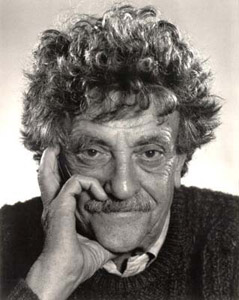

"I am motivated by two concerns to specifically examine the science in Vonnegut's stories in order to account for which stories will endure. First, the status of Vonnegut's pure science-fiction writing has long vexed Vonnegut scholars and Vonnegut himself. Critics seem to gravitate instinctually to those stories with not whiff of science, as Klinkowitz does with 'The Hyannis Port Story,' or as I would with "More Stately Mansions" and "Adam." Many of my favorite Vonnegut stories could be tagged as science fiction only through great contortions. Having been weaned on the so-called New Wave science fiction of the late '60s and early '70s (which conveniently employed 'SF' to cover everything from 'Science Fact' to 'Speculative Fantasy'), I easily could be guilty of Vonnegut's charge in his essay "Science Fiction" against those who habitually stick, say, a writer of Kafka's caliber into the science-fiction category in order to raise the field's literary pedigree. So to be fair to science fiction qua science fiction, we need to cut close to the science involved. This does not mean, however, that even if the proves inadequate or dated taht the story will collapse.
"Second, though no one denies that many of Vonnegut's best novels have science-fiction elements, those novels seem to be inoculated against the failure of particular scientific or technological predictions. The Sirens of Titan, for example, is seemingly unaffected by the fallacy of one of the core ideas on which the plausibility of the story depends--that is, that the Great Wall of China is visible from outer space. We might explain the problem away by arguing that the alien watchers have a really good supertelescope at their disposal, but ad hoc fixatives aren't necessary, because most of the novels, unlike most of the short stories, transform scattershot science into absurd, or ironic science."
--Jeff Karon, "Science and Sensibility in the Short Fiction of Kurt Vonnegut"
"Kurt Vonnegut is a self-professed agnostic firmly grounded in the tradition of his German freethinking relatives. As such, his morality comes without metaphysical props. Instead, his moral thinking and writing reflect a rhetorical orientation--one for which the self is never disembodied from the community, the history, and the discourses of which it is a part. For Vonnegut, understanding the narrative self is an inescapable feature of identity and morality, both central concerns of his work...
"Vonnegut draws attention to himself as artistic creator and claims the work produced a transformation in him. This is central to an understanding of his importance as a writer and a crucial indictor of the thematic direction his work takes in the novels and essays that follow. From Breakfast of Champions on, Vonnegut focuses his energies around a constellation of questions about the nature of narrative, its ability to transform the self, and the implications of viewing the self as a form of narritive."
--Bill Gholson, "Narrative, Self, and Mortality in the Writing of Kurt Vonnegut"
"An acknowledged practitioner of the postmodern novel, Vonnegut nevertheless has approached his writing with as much concern about communicating the sanctity of all life as he has with finding the appropriate stylistic vehicle for his message. Looking back over his prodigious body of work--beginning in 1952 with Player Piano and concluding in 1997 with his most recent novel Timequake--compels us to move forward and backward, in and out of our own place in time to view Vonnegut's vision of the century to come. Such a perspective affords us with the opportunity to see the breadth of his vision and the importance of his role as an ethical guide for the present generation. While much has been writeen about Vonnegut's place in postmodern literature, as well as his position as a sardonic moralist for several decades of fans, these two visions of one of this century's most important writers remain unwed. Because Vonnegut joins postmodern metafictional techniques with what upon first glance appears to be a modernist humanism, he remains an enigma and an anomaly in contemporary literature--a writer who bridges two disparate worlds, demonstrating the viability of a postmodern humanism."
--Todd F. Davis, "Apocalyptic Grumbling: Postmodern Humanism in the Work of Kurt Vonnegut"
For an essay by the creator of this website on the viability of the religion "Bokononism" as described by Kurt Vonnegut in the novel Cat's Cradle, .